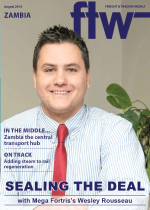South African freight
operators have set
their sights on growth
opportunities in Zambia
and its neighbours.
In 2014, according to the United
Nations Department of Economic
and Social Affairs, African
economies should see average
growth of 4.7%, compared to 1.5%
in Western Europe or Japan, and
2.5% in the USA.
The World Bank forecasts 2%
growth for South Africa.
Up to 80% of all goods within
Africa are carried by road.
“It’s not rocket science. South
African companies looking to
expand should be taking advantage
of booming African development,”
says Andre Jansen van Vuuren,
divisional marketing director of
Cargo Carriers.
“Especially when you consider
that many African contracts are
dollar-based – providing a valuable
currency hedge,” he adds.
In July 2012 Cargo Carriers
acquired a 55% stake in Zambian
haulage company BHL in order
to expand its footprint in Zambia,
Namibia, the DRC and Angola.
“Having a local operation,
someone who understands the lie of
the land better than we do, is vitally
important,” says Van Vuuren.
“Local knowledge makes it
easier, and as a springboard into
Africa it was definitely a good
move.”
Initially focused on the mining
industry, BHL is successfully
expanding into the manufacturing
and agricultural sectors.
Cargo Carriers assisted BHL in
increasing its fleet from 75 to 126
trucks – giving
it 60% more
capacity.
Both parent
company and
subsidiary
are confident
of long-term
returns.
Road
transport is
keeping the
wheels of
the growing
African
economies turning.
Despite accelerating upgrades,
the rail infrastructure is not able
to handle the volumes of freight
being moved in and out of ports,
as well as cross border, he says.
Africa’s road network presents
its own unique challenges.
“Lowering these risks,” Van
Vuuren says, “was one of the
reasons Cargo Carriers opted for
co-ownership with a local partner
rather than trying to open a new
division on their own”.
The variable quality of African
roads and the vast distances
between maintenance facilities,
also have to be taken into account.
Buks van Rensburg, founder and
now co-owner of BHL, considered
it a priority when their fleet was
upgraded in
2012.
“Your trucks
need to be
tough enough
to handle bad
road conditions,
but you don’t
want something
too complicated
either. The
reason we
elected to buy
FAW trucks
direct-fromsource
in China was that they’re
actually less sophisticated than
trucks we could have bought from
Europe.
“The problem there is that they
have such sophisticated computer
diagnostics built in. If anything
goes wrong, you need to call in an
expert to service them – and the
truck stands idle while you wait.
“The FAW trucks aren’t as
dependent on complex electronics,
so we are able to service and
maintain them in our own
workshops and minimise
downtime on each vehicle. Not
only are we saving 8% in fuel
costs, but we’re also running at
over 90% utilisation – compared
to our 65% utilisation on ‘more
sophisticated’ European vehicles.
It all adds up to reduced costs that
we can pass on to clients.”
Reducing fuel costs, turnaround
times and downtime all help
reduce costs, but sustainable
penetration into Africa also
requires constant innovation.
A tipper/tanker configuration
built to Van Rensburg’s design
allows BHL trailers to carry bulk
and liquid cargo simultaneously or
on alternate trips.
This means that BHL can carry
copper concentrate via tipper from
mine to smelter, for example, and
then return with a tanker full of
sulphuric acid for the mine.
The tippers can also be swapped
for container trailers.
BHL is continuing to grow.
“We’re receiving enquiries
from existing customers in South
Africa,” van Vuuren says.
“So the market is definitely
there, and it’s growing – especially
in SADC and East Africa.”
INSERT & CAPTION
Having a local operation,
someone who understands
the lie of the land better
than we do, is vitally
important.
– Andre Jansen van Vuuren
CAPTION
Initially focused on the mining industry, BHL is successfully expanding into
the manufacturing and agricultural sectors.

